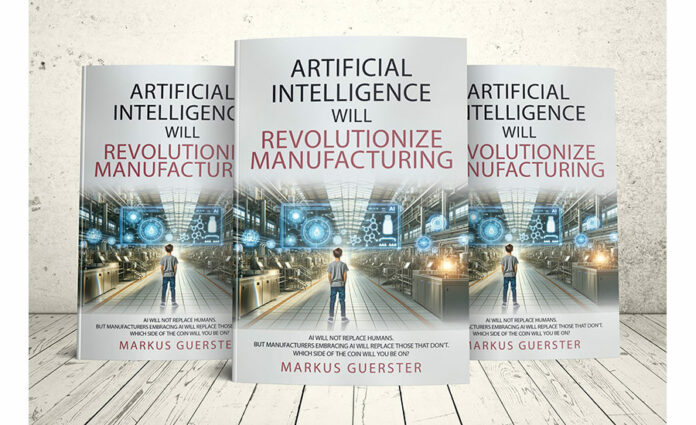Markus Guerster, the founder and CEO of MontBlancAI, brings a fresh perspective on the intersection of artificial intelligence and manufacturing in his book, “Artificial Intelligence Will Revolutionize Manufacturing.” Released in 2024, Guerster’s book takes readers on a journey through the evolution of AI technology, exploring concepts such as machine learning, deep learning, generative AI, and ChatGPT technologies.
The book serves as a guide for food manufacturers looking to leverage Industry 4.0 and AI strategies to optimize their operations. Guerster emphasizes the importance of understanding the Industry 4.0 flywheel, return on investment (ROI), the connection between machine learning and AI, neural networks, and unsupervised learning in the context of AI adoption in manufacturing.
As we approach 2025, the food industry is at a critical juncture in its adoption of AI technologies. Guerster highlights the rapid pace of AI adoption in the industry, driven by a combination of peer pressure and a lack of accessible resources for getting started with AI. While initial enthusiasm for AI investments has waned, companies are now taking a more pragmatic approach to AI adoption, focusing on practical solutions to address specific pain points within their operations.
One key trend in AI adoption among food manufacturers is the shift towards agile methodologies. By starting with small, focused pilot projects and iteratively building on successful solutions, companies can minimize risk and maximize the value of their AI investments. The decreasing cost of piloting AI technologies has also made it more accessible for companies to experiment with AI solutions and learn from their experiences.
Data governance and maturity are essential components of preparing for AI modeling in manufacturing. Guerster emphasizes the importance of clean, reliable data as the foundation for AI and machine learning applications. Companies must invest in robust data collection, cleaning, and storage processes to ensure the accuracy and reliability of their AI models. Guerster’s experience with MontBlancAI has highlighted the challenges that companies face in managing large volumes of data and the importance of developing scalable solutions for data processing and analysis.
In terms of ROI, larger and medium-sized food manufacturers are investing in building a strong data foundation to support their AI initiatives. By prioritizing data governance and infrastructure development, companies can position themselves for success in leveraging AI technologies to drive operational efficiencies and business growth. Guerster emphasizes the need for companies to focus on vertical solutions that deliver tangible value in the short term, rather than getting bogged down in complex and costly data infrastructure projects.
Overall, Guerster’s insights offer valuable guidance for food manufacturers looking to navigate the rapidly evolving landscape of AI adoption in manufacturing. By embracing agile methodologies, prioritizing data governance, and focusing on practical solutions, companies can unlock the full potential of AI to revolutionize their operations and drive sustainable growth in the years to come. In the rapidly evolving landscape of data governance, small- to medium-sized food manufacturers are beginning to recognize the importance of establishing a solid data foundation. This shift in mindset is also being felt by larger food companies, who are now facing increased pressure to demonstrate a return on investment (ROI) in their data governance initiatives.
Initially, many boards took a patient approach, willing to invest both time and resources into building a robust data infrastructure for the future. However, as the need for tangible results becomes more pressing, boards are now demanding answers to crucial questions about how to effectively leverage the data that has been collected. What are the next steps? How can we maximize the value of our data?
Smaller companies are taking note of this shift in focus and are adopting a “clean and organize the data first” approach. These companies recognize the need to quickly calculate ROI on their data governance efforts and understand the importance of laying a strong foundation by cleaning and organizing data before diving into specific use cases. By taking the time to properly structure their data, companies can more efficiently identify which data is essential for their operations, leading to more targeted and impactful data-driven decisions.
This strategic shift towards prioritizing data quality and organization is especially crucial for food processors, who rely on accurate and timely information to monitor the performance of their processes and machines. With the help of machine learning and artificial intelligence (AI), companies can gain valuable insights into the behavior of their operations and equipment, allowing them to proactively identify issues before they escalate.
By leveraging AI capabilities, food processors can train algorithms to recognize patterns of normal operation and alert them to any deviations that may indicate a potential problem. This predictive maintenance approach not only helps companies avoid costly downtime and production delays but also enables them to optimize their processes for greater efficiency and performance.
Overall, the growing emphasis on data governance and utilization within the food industry underscores the transformative power of data-driven decision-making. As companies of all sizes seek to harness the full potential of their data assets, it is essential for them to prioritize data quality, strategic organization, and advanced analytics capabilities. By investing in a solid data foundation and leveraging cutting-edge technologies like AI and machine learning, food manufacturers can unlock new opportunities for innovation, growth, and competitive advantage in an increasingly data-driven world.
In conclusion, the evolving landscape of data governance in the food industry presents both challenges and opportunities for companies looking to capitalize on the power of data. By embracing a proactive approach to data management, prioritizing data quality and organization, and leveraging advanced analytics technologies, food manufacturers can position themselves for success in an increasingly data-driven marketplace.




